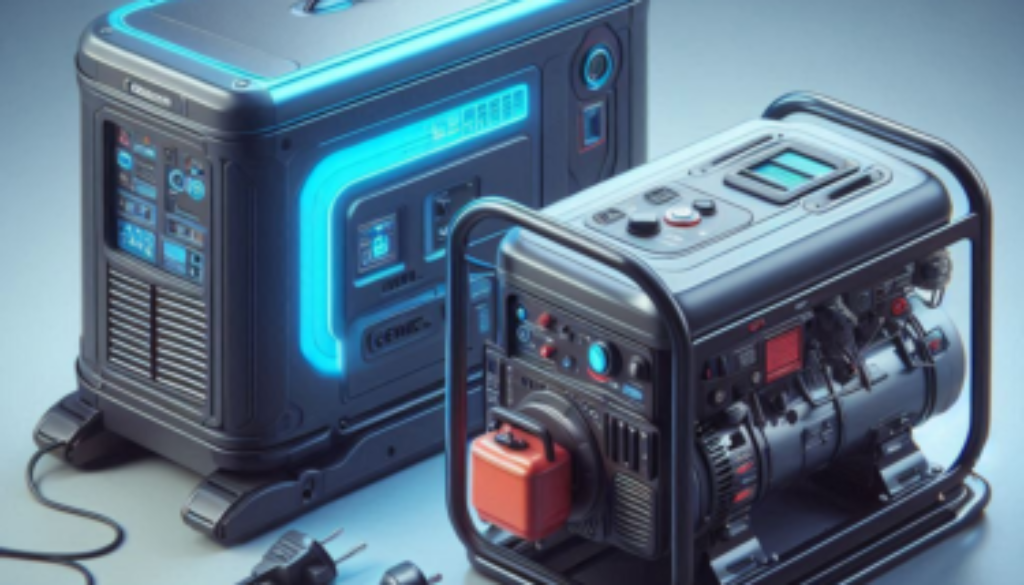Electric vs Gas Backup Power: 6 Shocking Truths You Need to Know
Electric vs Gas Backup Power: 6 Shocking Truths You Need to Know
Overview:
Backup power systems are essential for maintaining electricity during grid failures. The two main types are electric battery systems and gas-powered generators. Electric systems store energy in rechargeable batteries, offering clean and quiet operation. Gas systems burn fuel to produce power, providing longer runtimes but with noise and emissions. Understanding the differences helps homeowners choose the best option for their needs.

Deal of the day: Jackery Explorer 1000 v2 Portable Power Station(2024 New),1070Wh LiFePO4 Battery,1500W AC/100W USB-C Output, 1 Hr Fast Charge, Solar Generator for Outdoor Camping,Emergency, RV, Off-grid Living https://a.co/d/2tJGY0c
6 Key Differences Between Electric and Gas Backup Power:
- Energy Source and Storage
Electric systems use rechargeable batteries to store energy from the grid or solar panels. Gas systems require fuel like propane or natural gas to generate power. Battery systems have limited capacity but can recharge, while gas systems run as long as fuel is available. - Environmental Impact
Electric battery systems produce zero emissions during use, making them environmentally friendly. Gas generators burn fossil fuels, releasing carbon dioxide and other pollutants. For eco-conscious homeowners, electric systems offer a cleaner alternative. - Noise Levels
Battery backup systems operate silently, ideal for residential areas with noise restrictions. Gas generators produce significant noise when running, which can be disruptive to neighbors. The quiet operation of electric systems is a major advantage for many users. - Maintenance Requirements
Electric battery systems need minimal maintenance, typically only requiring periodic software updates. Gas generators demand regular maintenance, including oil changes, filter replacements, and fuel system checks. This difference in upkeep can impact long-term costs and convenience. - Initial and Operating Costs
Electric systems often have higher upfront costs but lower operating expenses. Gas generators are usually cheaper to purchase but incur ongoing fuel and maintenance costs. Over time, electric systems may prove more cost-effective, especially when paired with solar panels. - Power Output and Duration
Gas generators can provide high power output for extended periods, as long as fuel is available. Battery systems have limited capacity but can be sized to meet specific needs. For long-term outages, gas systems may offer more reliable continuous power.
FAQs:
- How long can a battery backup system power my home?
Battery backup duration depends on system capacity and energy usage. Typical systems can power essential appliances for 4-12 hours. - Are gas generators safe to use indoors?
No, gas generators must be operated outdoors due to carbon monoxide emissions. Always follow manufacturer safety guidelines. - Can I use solar panels with a battery backup system?
Yes, many battery systems integrate with solar panels, allowing for renewable energy storage and use. - What size generator do I need for my home?
Generator size depends on your power needs. Calculate the wattage of essential appliances to determine the appropriate size. - How often should I maintain my gas generator?
Regular maintenance is crucial. Perform basic checks monthly and schedule professional service annually or every 100 hours of use. - Can battery backup systems power my entire home?
While possible, powering an entire home requires a large and costly battery system. Most homeowners choose to back up only essential circuits.
Conclusion:
Choosing between electric and gas backup power systems depends on individual needs, budget, and environmental concerns. Electric battery systems offer clean, quiet operation with minimal maintenance, ideal for short outages and eco-conscious users. Gas generators provide longer-lasting power for extended outages but require more upkeep and produce emissions. Consider your specific requirements and consult with a professional to determine the best backup power solution for your home.
Deal of the day: Jackery Explorer 1000 v2 Portable Power Station(2024 New),1070Wh LiFePO4 Battery,1500W AC/100W USB-C Output, 1 Hr Fast Charge, Solar Generator for Outdoor Camping,Emergency, RV, Off-grid Living https://a.co/d/2tJGY0c
Evaluate your home’s power needs and research local providers to find the ideal backup power system for your situation.
For more information on home energy storage systems, visit the U.S. Department of Energy’s guide: https://www.energy.gov/energysaver/home-energy-storage-systems
My Business Web Space may earn an Affiliate Commission if you purchase something through recommended links in this article.
Discover more from My Business Web Space
Subscribe to get the latest posts sent to your email.

You must be logged in to post a comment.